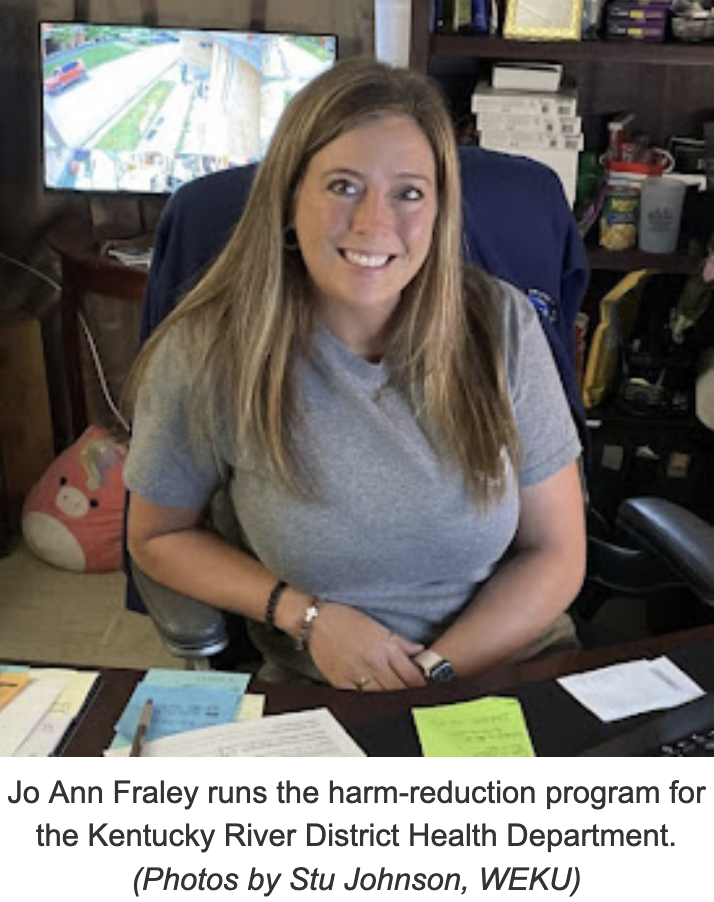Lee Co. harm-reduction chief says 80% of clients are homeless

By Stu Johnson, WEKU
Homelessness is a reality in virtually every section of Kentucky. Although often thought of as an urban challenge, rural Kentucky also finds the plight of the unhoused a pressing issue. Here’s a glimpse of how one Appalachian community is addressing homelessness needs.
There is a gathering spot inside The Hub in downtown Beattyville. It’s the Lee County Health Department‘s harm-reduction center, where staff work to connect clients with care providers.
The director is Jo Ann Fraley, a social worker who’s worked in addiction and recovery. Fraley said about 80 percent of The Hub’s clients live on the streets or are couch surfing, and many don’t realize their health status.
“Lot of them have blood-pressure issues and they don’t even know. A lot of them have diabetes and they don’t even know,” Fraley said. “So, those issues we need to address as quick as we can.”
Fraley said the focus is getting people hooked up with doctors and health providers, because “We can’t expect change if we don’t help with the changing process.”
“They’ve lost hope. They give up. They’ve burnt every bridge that they have with family. And so, they let themselves go and they just think nobody cares about them. And whenever someone goes somewhere and they’re not treated very nice, they don’t go back,” said Fraley.
Another staff member at The Hub is Shawn Maynard, who was a user of oxycontin, pain pills, and then methamphetamine, along with alcohol. Maynard has been clean for six years and works with clients to address barriers. He said the homeless lifestyle itself creates health risks.
“When you’re homeless, your hygiene’s not gonna be good and that’s gonna create infection, staph infection,” said Maynard. “If you do get a cut and you’re not getting the proper wound care for it, it’s gonna get infected.”
 Nathan Tipton, a client of The Hub, said he’s been four months clean after struggling with drugs for years.
Nathan Tipton, a client of The Hub, said he’s been four months clean after struggling with drugs for years.
“I was on meth and drinking real bad and after my papa and mama died, it got worse and stayed out there in the woods for about four and half year; still homeless, but life makes a big difference when you got God on your side,” said Tipton.
Tipton said it’s different from before, he was stealing and robbing to get a fix.
The Lee County Health Department is part of the Kentucky River Health District. District Health Director Scott Lockard said he and Fraley brainstormed over The Hub concept, and said creating bonding relationships is important.
“We form that relationship. We show them that they can be treated with dignity. We establish trust and then when the timing is right and they’re ready for treatment, we can link them to treatment immediately,” said Lockard.
“Health is the foundation for everything. If you don’t have health, you can’t worry about education, you can’t worry about employment. You can’t worry about everything else.”
So, Lockard said that means linking up to a medical home and making sure the clients have a payer source, which for most is Medicaid. He said some don’t even realize they are eligible for the fedreal-state program that provides free medical care to lower-income people.
Lockard said the district is trying to to establish a similar program in Letcher County, and he envisions similar like services in all seven Kentucky River District counties, ideally in the next five years or so. Besides Lee and Letcher, the district also includes Knott, Perry, Leslie, Owsley and Wolfe counties.
Kentucky Health News is an independent news service of the Institute for Rural Journalism and Community Issues, based in the School of Journalism and Media at the University of Kentucky, with support from the Foundation for a Healthy Kentucky.
Donate to Kentucky Health News here.